What Rescuers Did For This Literal One-Of-A-Kind Orangutan Is Incredible
With her piercing blue eyes and snow-white hair that set her apart from her ginger-haired friends, Alba, a Bornean orangutan, is the only known albino orangutan in the world.
Alba, which happens to be the Latin word for "white," was given her name through a contest held by BOSF. While they received thousands of suggestions, they believed there was no better fit for her than "Alba." Rescued in 2017 from fascinated villagers who were keeping her locked up in a cage, the Borneo Orangutan Survival Foundation (BOSF) teamed up with the Central Kalimantan Natural Resource Conservation Agency in Indonesia to provide Alba with the care she desperately needed.
At the time of her rescue, Alba was determined to be approximately 5 years old and was found to be greatly distressed, dehydrated, and infected with parasites. She was sent to the Nyaru Menteng Orangutan Rescue and Rehabilitation Center, where she spent nearly two years under their care and supervision to regain her health for eventual release.
Her recovery was slow-going, as her albinism made her more susceptible to various health problems, including poor vision and hearing, sensitivity to light, and an increased risk of developing skin cancer.
She is also exponentially more vulnerable to poaching due to her unique lack of pigmentation. Despite her health risks, she demonstrated “excellent climbing and socialization skills,” according to BOSF.
Read on to learn more about Alba and her journey.
Orangutans are great apes
They are closely related to humans, sharing 97% of DNA in common.
There are three species of orangutan: Bornean, Sumatran, and Tapanuli. All three species are critically endangered and exist only on Sumatra, an Indonesian island, and on the island of Borneo, which is shared by Indonesia, Malaysia, and Brunei.
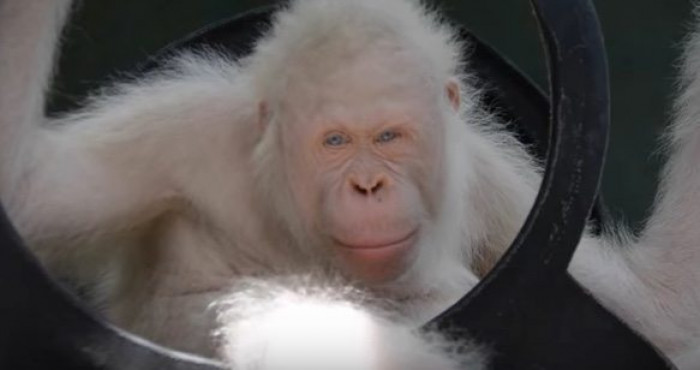
Orangutans are primarily threatened by habitat loss.
Large regions of their forests have been taken over and cleared for agricultural purposes, primarily for palm oil production.
Orangutans have been hunted for food and attacked when their dwindling habitat forces them into contact with humans. Occasionally, young orangutans have been known to be hunted and captured for the illegal pet trade.
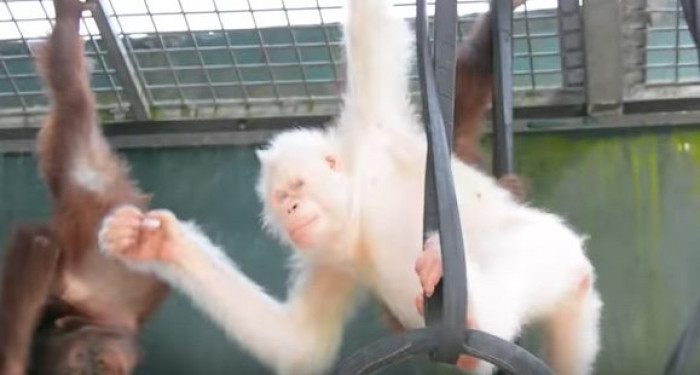
Alba's rare appearance is the exact reason poachers would want to capture her.
To prevent Alba from becoming acclimatized to humans, the conservationists were extremely careful in how they handled her. The worst thing for her would be losing her independence and becoming reliant on humans for her survival.
However, Alba expressed a “firm dislike for human presence from the very beginning,” according to BOSF. When released from her cage, Alba was relieved to be rid of her human helpers, escaping to the top of a nearby tree.

After gaining worldwide attention, the rescue groups put together an ingenious plan to protect her.
To help keep her safe, rescuers built a 10-hectare island just for her. This island is cut off by a canal that serves as a natural border.
The island is monitored non-stop, 24 hours a day, with regular patrols conducted by the staff. The staff members collect data on the orangutan's behavior and health.
In addition, they have set up two feeding platforms that provide supplementary food twice daily.
This little section of paradise isn't just for Alba alone; she shares it with three orangutans considered to be her best friends: Radmala (a 4-year-old female), Kika (a 6-year-old female), and Unyu (a 4-year-old male).
It is said that they have shown affection and fondness for each other from the moment they were introduced. Now they have the chance to enjoy the rest of their lives together in the protected forest.
Spending the rest of your life on a protected island with provided food AND your best friends? Honestly, that sounds divine.
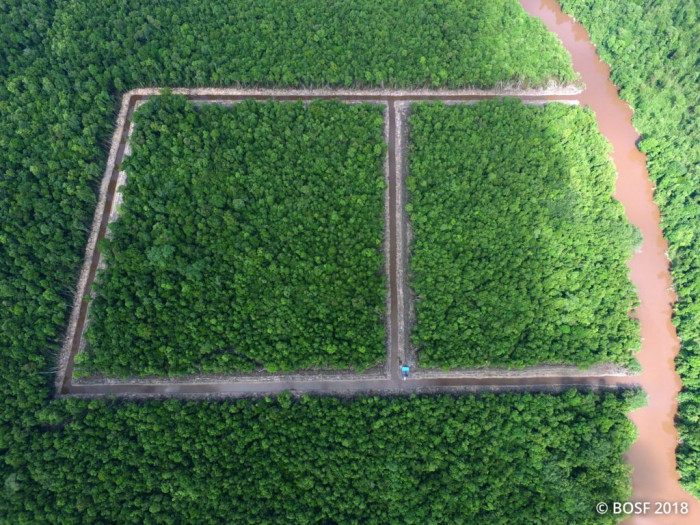
Alba's first year back in the wild
Conservationists shared that during her first year back in the wild, Alba spent her time eating, traveling, and resting.
Agung Nugroho, head of the Bukit Baka Bukit Raya National Park Authority, said his team reported that “Alba is capable of extensive exploration, skillful foraging, and deft nest building. She also socializes with other released orangutans within the national park.”
He also shared that it was especially special to see Alba crossing paths with Unyu, as the pair had previously been housed together at the rehabilitation center.
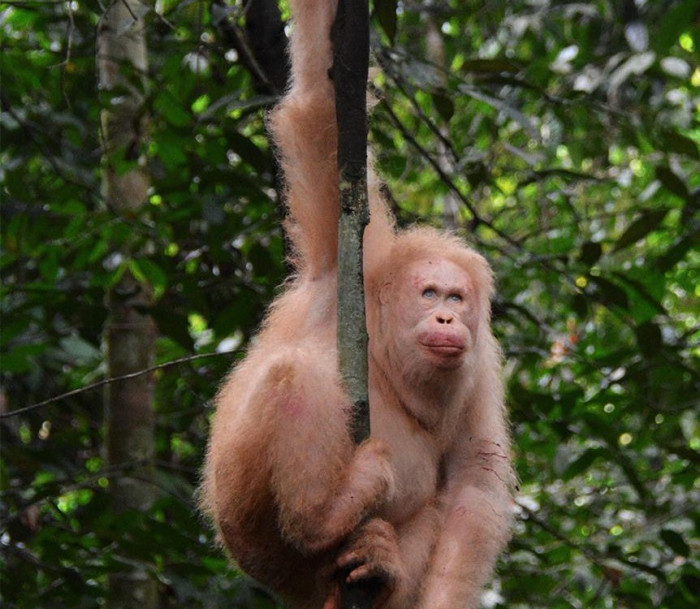
Conservationists will keep an eye on Alba
The BOSF and the Bukit Baka Bukit Raya National Park Office will continue to monitor rehabilitated orangutans after their release, including Alba, to ensure she and the others continue to thrive.
Her progress so far has been “truly positive,” Nugroho says. “We all hope that Alba continues to survive in this forest and live wild.”
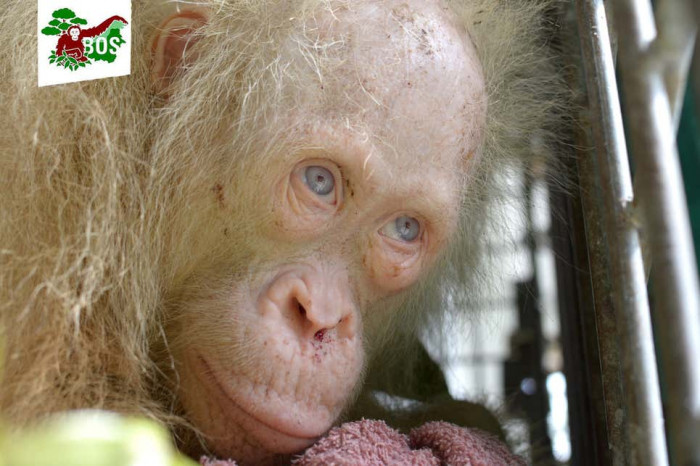
How she came to be Alba
Watch further to learn more about Alba and the efforts to keep her safe and healthy!
Give thanks to the Borneo Orangutan Survival Foundation
Thanks to the efforts of the Borneo Orangutan Survival Foundation, Alba gets to cherish and lead a long, healthy, and happy life with her friends, away from the harm of humans.
Alba is still enjoying her life hanging around at the national park, and BOSF conservationists say she’s doing well. She spends most of her days like any other orangutan, exploring the forest and eating the delicious, nutritious foods that grow in the forests she gets to explore.
According to BOSF, apart from her explorations and foraging activities, she likes to build nests, interact with her orangutan friends, and get plenty of rest. The BOSF can always use any financial contributions to benefit Alba and other orangutans in need, and if you’d like to donate, you can do so here.
The collected money will help in numerous ways, such as acquiring protected forests for the release of rehabilitated orangutans, aiding the team rescuing orangutans, supporting their enrichment team and veterinary staff, as well as funding the orangutans’ daily needs, including medical care for Alba.
Be sure to share this incredible story about Alba with your friends and family.



